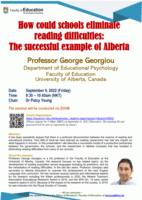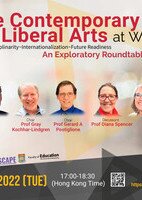[Online seminar] Neural Predictors of Individual Language Learning Success
Seminar
Date
August 26, 2022 (Fri)
![[Online seminar] Neural Predictors of Individual Language Learning Success](/f/event/50970/250p392/Poster.jpg)
Human language learning differs significantly across individuals in the process and ultimate attainment. Although decades of research exploring the neural substrates of language learning have identified distinct and overlapping brain networks subserving learning of different components, the neural mechanisms that drive the large interindividual differences in learning success are still far from being understood. In this talk, Dr Feng Gangyi will introduce recent works from his team on neural mechanisms of language learning across multiple components (e.g. auditory and speech category learning, word and grammar learning). With machine learning and predictive modeling techniques, Dr Feng’s team has identified potential neuromarkers that showed robust predictive powers of individual learning success. Identifying the neuromarkers has direct implications for constructing contemporary cognitive neuroscience models of language learning and informing educational practice and clinical research. The neuromarkers and mechanisms derived from this line of work have the potential to be applied to predicting individual language improvement and outcomes for populations with language deficits and developmental delays. The neuromarkers and prediction techniques could be leveraged in designing individualised training and intervention paradigms that maximise learning efficacy and minimise individual differences in outcome.
About the speaker:
Dr Feng Gangyi is a Research Assistant Professor of Department of Linguistics and Modern Languages, The Chinese University of Hong Kong (CUHK); a Member of the Brain and Mind Institute. Dr Feng received his undergraduate degree in Applied Psychology and doctoral degree in Cognitive Psychology from South China Normal University. Before joining CUHK, Dr Feng completed his postdoctoral training in Neurolinguistics and Cognitive Neuroscience at CUHK and the University of Texas at Austin. His research team uses contemporary cognitive neuroscience approaches, including functional magnetic resonance imaging (fMRI), Magnetoencephalography (MEG), and diffusion tensor imaging (DTI), along with a systems neuroscience technique (e.g. multivariate decoding and predictive modeling analysis) to grasp a richer understanding of the cognitive and neural mechanisms of language learning, speech processing, and semantic representation in healthy adults and clinical populations. His research has been published in high-impact journals, such as PNAS, Journal of Neuroscience, Cerebral Cortex, NeuroImage, and Human Brain Mapping. His research has been supported by external and university funding schemes, including the General Research Fund (GRF 2019; 2022; as PI), Collaborative Research Fund (CRF 2020; 2022; as co-PI), Innovation and Technology Fund, and National Natural Science Foundation of China.
Moderator:
Dr Guang Ouyang,Assistant Professor, Academic Unit of Human Communication, Development, and Information Sciences, Faculty of Education, The University of Hog Kong
Registration:
https://hku.zoom.us/meeting/register/tJMqd-2trTgpGdM5B2GlaUPtbcOqrnxMDsD9



